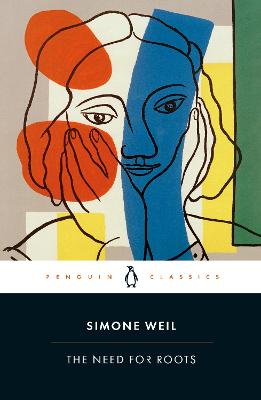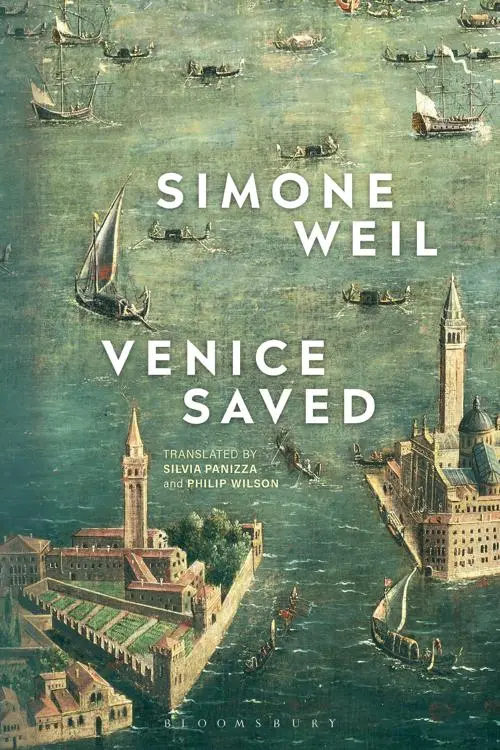The Challenges of Translating Simone Weil’s Literary Works
Silvia Caprioglio Panizza & Philip WilsonReaders are willing to accept a translation as a representation of something written in another language. People say they have read Simone Weil’s The Need for Roots, when in fact they have read an English translation by Arthur Wills of a French work entitled L’enracinement. It will soon be possible to read another translation by Ros Schwartz, and the existence of multiple versions is an indication that translation is not a mechanical process, even though that is often how it is perceived by those who have never taken on the task. Over the last five years, we have been working on translations of Weil’s tragic drama and her poetry. Here we reflect on some of the challenges of translating this philosopher. We have given a fuller account in the introductions to our translations Venice Saved (Weil 2019) and Mirror of Obedience (Weil forthcoming), and this article is to be read as supplementary to that work.

The most basic challenge that faces any translator is accordingly: “How can I write a target text that can represent the source text in the form of life of the reader?” If you translate a manual for a washing machine, then it’s easy enough to test if your work is any good, by seeing if English-speaking users can use it to get clean clothes. Weil’s texts do more than impart information, however. To translate them involves recreating the style of the mind that formed them (cf. Boase-Beier 2019). L’enracinement, for example, is a work of argumentation, of persuasion and of prophetic vision. One of the interests of Schwartz’s forthcoming translation will lie in its paratextual material, which will show how one translator responds to Weil’s thought.
Weil’s literary works: a close reading
Our own translation encounter with Weil has been in the form of her specific literary output. Like many other canonical French philosophers, such as Simone de Beauvoir, Weil turned to literature to do things that she could not do otherwise. This literary work mattered to her – she wrote about her desire to publish her poems, for example – and it ought to be available in English and in other languages (although the play and poetry have already been translated into Italian ). Literature shows, rather than tells. Thus, we wanted to produce translations that would do what the source texts do.
Our first approach was to engage in a close reading – in the sense of reading for translation, of asking how certain words might be translated, of trying to get our heads around the spirit of the writing. For this task, knowing Weil through her other, non-literary writing, was indispensable and yet at the same time risky. It was important to know the spirit of the writer, which we encountered through the notebooks and her letters, and to know her philosophy, which we were familiar with through her essays.
Many of Weil’s key ideas are represented in her literary work, and it was necessary to recognize those instances. At the same time, we had to be careful not to read too much of what we already knew about Weil’s thought and spirit into the poems and the play. We had to avoid, in other words, letting our understanding of her work in other disciplines force an interpretation of her literary work when such an interpretation was either an imposition or an undue clarification of what should remain ambiguous.
One example in which the translation of Weil’s poetry would have been different without a knowledge of her philosophy was the line in the poem ‘Les Astres’ / ‘The Stars’:
Puisqu’il le faut, nous vous suivrons, les bras liés …
The poem was written in 1941-2, during the mature phase of Weil’s thought, when many of her central ideas were being elaborated. Liés could be translated as ‘linked’ or ‘tied’, and could signal either kinship and union, or constraint and obligation. One possibility for translation, then, was:
All we can do is to link arms and to follow …
Yet, knowing Weil’s strong opposition to ‘the social’, this translation seemed to present too positive an alliance. Further, knowing Weil’s ideas about necessity and obedience, the word liés led us instead towards the imagery of being tied or chained. The choice of image was also supported by Weil’s use of it in two other poems, ‘The Sea’ (‘Mer éparse, aux flots enchaînés pour toujours’, [Sparse sea, chained for eternity to the flows]) and ‘Necessity’ (‘Déchirez les chairs, chaînes de clarté pure’ [Tear up the flesh, you chains of pure clarity]). Both poems, as one of the titles indicates, describe necessity and obedience. Hence, we settled for:
Since we must, we follow you, with our arms in chains …
Our translation preserves the idea of obedience and avoids a positive representation of social groups, while at the same time maintaining some of the ambiguity of the source text.
Weil’s literary works: outside influences at play

Reading for translation also meant working out what influences were at play in the source texts. We turned into researchers. For example, we learned that Weil took the plot of her tragedy Venise Sauvée (about a failed 1618 conspiracy by Spanish mercenaries to overthrow Venice) from a prose account by the Abbé de Saint-Réal, which we read, along with another work based on Saint-Réal, Thomas Otway’s 1682 tragedy Venice Preserv’d, known to Weil under the French title Venise Sauvée. At this point we chose our own title, Venice Saved, which mirrors Otway’s title but dies not duplicate it, and maintains Weil’s word order as a sign to readers that they are reading a translation from French, where adjectives typically follow nouns. So many issues arise just from the translation of two words, but the issue is indicative of how translation is about choice, about what can be imitated, what may have to be abandoned – English, for instance, cannot replicate the feminine ending on the adjective in the French – and what can be preserved, to use Otway’s word.
Weil’s literary work has never previously appeared in English, which influenced our decision to write a target text that would stay close to what she did. Venise Sauvée is unfinished, though it does have an ending, and Weil left notes for unwritten scenes so that it can be read as a unity and can offer readers (and translators) a unique glimpse into her thoughts as she was writing. We maintained the incomplete nature of the play as an exercise in representation. Perhaps one day somebody will write the missing scenes, possibly for a performance, but that day is not here yet (cf. Szirtes 2014: 62).
When it came to the poetry, we were pleased that Bloomsbury was prepared to produce a bilingual edition, with the French poems facing their English translations. (Mirror of Obedience will also include two prose pieces by Weil.) Readers who speak French will be able to follow what is going on in translation and those with no French will be able at least to compare the shape of poems and to track key words.

In both the poems and the play, Weil wrote a very traditional syllabic verse, attempting to find creativity through constraint. English verse typically works through patterns of stress, but we have also written syllabic verse in translation, as in these lines spoken by Jaffier in the play:
Afflicted man! For I could have seen all of this tonight,
could have feasted my eyes by now on such a spectacle.
What made me lose my way? What made me spare these assassins? (Weil 2019: 96)
The link between prose and poetry
As these lines show, we have chosen consistently to translate the noun ‘malheur’ and the adjective ‘malheureux’ as ‘affliction’ and ‘afflicted’, mirroring what are now widely used keywords not only in Weil’s philosophical and religious writings in English translation but also in English Weil scholarship. The importance of this move, in the absence of another English word that we deemed significantly more appropriate to convey the meaning of the original, lies in allowing the reader of Weil’s literary work to see the extent to which her prose and poetry contain her thought. Like ‘attention’ and ‘décreation’, ‘malheur’ is for Weil a theory-relative term that takes on a specific meaning within her metaphysics, her moral psychology, and her political thought. Keeping the word in the poetry is an immediate way of signalling that the poetry is a way of showing the same ideas that the essays discuss.
Whilst we do not necessarily think that translators should translate a text in line with what its author thinks about translation, we were both fascinated and challenged by Weil’s views. Her work contains many of her translations from Greek, and she rendered the New Testament for her own use as a way of getting to know a text. She also wrote that attention to a translation problem would allow the correct translation to emerge (Weil 1973: 111). It is a rather idealistic view, because all the attention in the world will not allow you to work out what is going on in a language you don’t understand, or prevent seemingly inevitable typos and slips, but what we did take from Weil was the need for humility and for patience before the source text, in order to echo its spirit (cf. Benjamin 2021: 93).
Revealing the mind of the author
Such echoing was both among the most inspiring and among the most challenging aspects of translating Weil’s literary works. Besides the difficulties of translating poetry as such, we had to grapple with the specific difficulty of showing the mind of an author who appears here as philosopher, as mystic, and as poet. The difficulty, in order words, of doing justice to all the layers present in a single text, while preserving the specificity of the poetry, and most of all trying to minimize the imposition of our own understanding of her complex mind upon the text – something that Weil recurrently cautions us against, in her philosophy but also in her poetry.
References
- Benjamin, W. [1923] (2021), ‘The Translator’s Task’, tr. by S. Rendall, in L. Venuti (ed) The Translation Studies Reader [Fourth Edition], London: Routledge, 89-97.
- Boase-Beier, J. (2019), Translation and Style, London: Routledge.
- Szirtes, G. (2014), ‘Reproduction Furniture’, in, J. Boase-Beier, A. Fawcett and P. Wilson Literary Translation: Re-drawing the Boundaries, Basingstoke: Palgrave Macmillan, 50-63.
- Weil, S. [1951] (1973), Waiting for God, tr. by E. Craufurd, New York: Harper and Row.
- Weil, S. [1955] (2019), Venice Saved, ed. and tr. by S. Panizza and P. Wilson, London: Bloomsbury.
- Weil, S. (forthcoming), Mirror of Obedience, ed. and tr. by S. Caprioglio Panizza and P. Wilson, London: Bloomsbury.

About the authors
Dr. Silvia Caprioglio Panizza is a teaching fellow at the School of Philosophy at University College Dublin. She is the author of The Ethics of Attention: Engaging the Real with Iris Murdoch and Simone Weil (Routledge, June 2022) and co-editor (with Mark Hopwood) of The Murdochian Mind (Routledge, June 2022).

Dr. Philip Wilson is an Associate Tutor, Faculty of Arts and Humanities, at the University of East Anglia. He is the author of Translation after Wittgenstein (Routledge, 2015) and co-editor (with J. Piers Rawling) of The Routledge Handbook of Translation and Philosophy (Routledge, 2018).
Drs. Panizza and Wilson also translated and edited Simone Weil’s Venice Saved (Bloomsbury, 2019).
2 Recommendations
